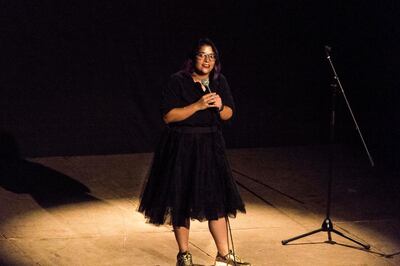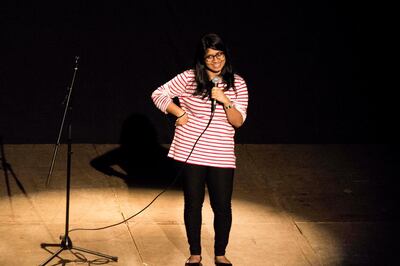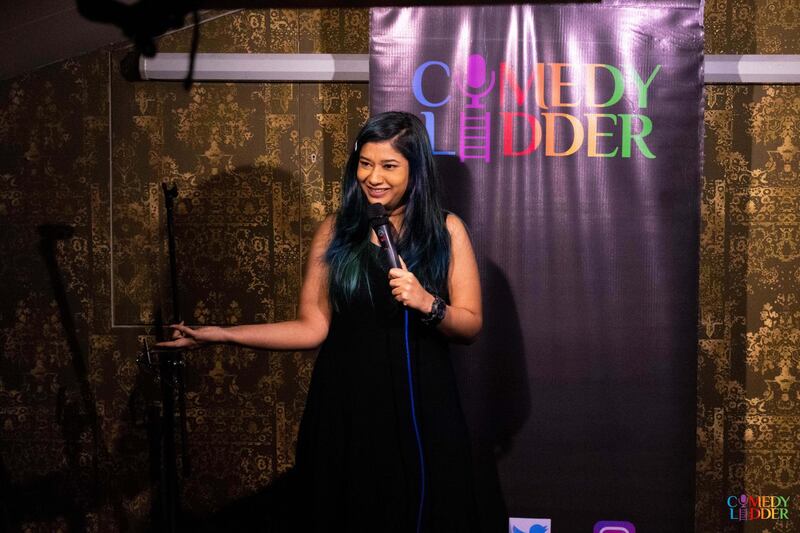"Nothing brings men across caste, creed, colour [and] culture together [more] than their hatred for a woman … And ladies, don't worry too much about loving men, because men don't need us to love them; they love each other enough," quips Aditi Mittal, one of India's most prominent comediennes, on her Netflix show Girl Meets Mic.
And it's safe to say this statement accurately describes the roots of FemaPalooza, India's only stand-up show by women, for women.
Conceptualised by comedienne Jeeya Sethi, FemaPalooza has successfully drawn throngs of women to its various events over the past three years. The National Centre for the Performing Arts in Mumbai has hosted eight performances, and the show has travelled to New Delhi, Chandigarh and Bengaluru, too. On Saturday, Sethi will host FemaPalooza at Above The Habitat in Khar, Mumbai, in celebration of International Women's Day. The seven-woman-strong line-up for that event comprises popular comics Sonali Thakker, Kajol Srinivasan, Prashasti Singh, Kruti Kattige, Unnati Marfatia and Niveditha Prakasam, as well as Sethi.

"It's like hanging out with your core group of girlfriends," says Thakker, 29, a regular performer at FemaPalooza events. "The atmosphere is electric, and women have context to each other's lives and thinking. It's not a cause, it's just a show we do for ourselves and it's really fun."
They are 'determined to shatter the glass ceiling on Indian comedy'
While Thakker has been in the business for nearly six years, starting off at open-mic events and eventually quitting a career in finance to pursue comedy full-time, Sethi, 38, has been a stand-up regular for three years. She's dreaming big, and determined to shatter the glass ceiling on Indian comedy that refuses to cave in. FemaPalooza is as much a way for her to grow as a comedienne as it is for her colleagues and friends, who are finally finding acceptance in the country's comedy circuit. "Even today, women don't want to perform at several venues," explains Sethi. The reasons are many; apart from a biased audience who tend to look down on female comics, and male comics whose jokes are generally the stuff women's nightmares are made of, organisers can be patronising.

These attitudes reflect the deep-seated patriarchy in Indian psyche, which can be challenging to face when there are just two women performing in a 23-strong line-up, for instance. "You have to make women a priority, only then will [their presence] become a norm," says Sethi.
A life changing gig
FemaPalooza has also helped Pavitra Shetty, 29, gain confidence as a stand-up artist, considering that initial shows were peppered with people who would leave to get drinks when she would get on stage (following a man), or come up just to tell her that she’s funny for a woman. “
The vibe at a FemaPalooza show is completely different,” says Shetty, a former IT professional. “It’s a safer environment, especially when you want to test new material and you’re vulnerable. Women mostly don’t have preconceptions when they come to these shows.”
Of course, things have changed significantly over the past couple of years. More and more women are giving comedy a shot – from an average of five open-mic participants four years ago, there are at least 100 today all over India. “Men are also more open to women’s issues, so when we talk about them at a show, there are men who are shocked at their lack of awareness,” says Shetty.
Sethi, who has been part of open mics in New York and Los Angeles, and runs the production company Comedy Ladder, envisages Indian comedy as an entity in itself, where people come to enjoy the entire genre, and not just a few popular comics. Naturally, the bar is high, and her priority is to promote talented, sincere comediennes to the next level. She teaches writing and performing stand-up as well, and she has quite the story herself.
Sethi's self-deprecating humour mirrors her life – the daughter of a wealthy and privileged family who strikes out to make a name for herself, busting stereotypes and making unseemly jokes about breasts, bras, menstruation, et al. While she once censored herself when her father came to watch her perform, now there's no turning back from her calling. Not only does she want to own a comedy room, but Sethi also wants to do a sell-out show at Madison Square Garden. "I've instated a no-wedding rule for myself," she laughs. "My family often try to hook me up at weddings, but there are 22-year-olds there. They're doctors, I'm a comedian, no one is looking at me.
“For 35 years, I did what society wanted me to do. Now I’m doing what I want. Women are growing out of patriarchy, leaving homes to pursue careers and lives for themselves.”
The liberation process is sloth-slow, though, and that's where FemaPalooza comes in. "People say: 'Women have started becoming funny.' But when were they not?" asks Sethi.
The shows are cathartic for the audience, too. “Some of the women who come to these shows live through us,” Sethi adds. “We say things they can’t or don’t. And their screams and laughter; how they enjoy themselves, it’s amazing.”
It’s not all male bashing, though, shows do tend to become unintentionally male-centric. The idea, however, is not to degrade men but to uplift women. “We [women] have our own problems,” says Sethi. “You should be honest when you’re doing stand-up; and emotional. Men [in India] are not funny because they’re not emotional. Comics, like actors, must bring sentiment to their sets.”
This is possibly why Thakker treats all her shows from a neutral point-of-view. “I was a lonely child, so I don’t really know sexism,” she says. “If the audience is not laughing, I’ll take it as my joke not being funny and work harder to do better. Laughter is involuntary, a spontaneous reaction. So, I don’t place much value on being a ‘female’ comic.”
Sethi has pertinent advice for aspiring female comics in India. “You will be who you are, so don’t try to become the next anybody.”
FemaPalooza will be at Above The Habitat in Khar, Mumbai, on Saturday






